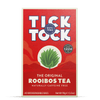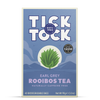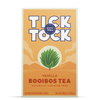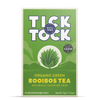As a small family business, honesty, integrity and sustainability are more than just words to us. We value the simple and the natural; from the special soil just right for rooibos, through the packaging we choose, all the way to the drink in your cup. It’s important to us to minimise our impact on the Earth – read on for how we do it.
PLANET & PEOPLE

PACKAGING PROMISE
We know you want the packaging your products come in to be sustainable. We’re very particular about this too, and are always striving for better. Let’s break it down:
OUR TEABAGS
All of our teabags are made from a plant-based, biodegradable material, 100% free from petrochemical plastics. You can dispose of them with your general waste, but even better to pop them in your food waste bin. While we’re big fans of garden composting, most home systems won’t provide the heat, pressure and microorganisms to ensure the teabags fully break down, so it’s best to let your council get the best from them.

INNER POUCH
All the pouches we use to keep our teabags, and loose leaf tea, fresh are recyclable along with plastic bags at larger supermarkets. We are looking for a better solution at the moment, so watch this space.

CARTONS
All Tick Tock boxes are 100% recyclable card. Open them up, flatten them down and add them to your paper recycling stack.
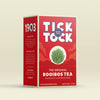

Together with biodiversity and soil preservation, we care about protecting the heritage and communities of the tea-growing areas for generations to come.

FARMING PRACTICES
We never use GM crops, we support organic farming practices and minimize the use of manmade fertilizers, pesticides and herbicides. We're also a member of the Rainforest Alliance and the Organic Food Federation. These small steps help us to protect the heritage of the rooibos-growing areas for generations to come.
SUPPLIERS AND GROWERS

We value every person involved in bringing your rooibos from farm to cup. Trading thoughtfully with all of our tea suppliers is a given, with relationships based on trust and respect going back decades. Thanks to these, we are able to encourage environmentally sound, ecologically progressive agricultural practices.
